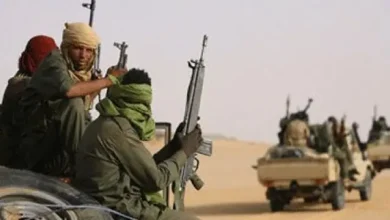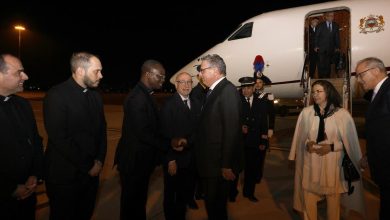Quarries in Morocco: Depletion of water resources and the continuation of the rentier economy

A. Latif Baraka: Heba Press
Quarries in Morocco are considered one of the vital sectors that still live in randomness in their management and control, despite the fact that the state control institutions have been alerted through reports written or through the grievances of environmental associations in all regions of the Kingdom. In fact, the topic of “quarries” has been discussed in many stations, especially within the legislative institution “Parliament”, as recognized by the ministers who have succeeded one another in the Ministry of Equipment, there are violations noted in quarries in Morocco, and to what extent lobbies benefit from their income and the money that the public treasury also loses, which makes this vital sector and its random nature threaten the environmental sphere and continue to establish a “rentier economy” “Heba Press” explores this sector, how it is managed. , the problems related to the lack of effective implementation of the regulatory law and the extent to which lobbyists profit from the revenues and deprive territorial groups of the income from these quarries.
– Laws in the stands and draining quarries
The government approved Decree No. 912-18-2 on the quarry police, which was published in the Official Journal on September 23, 2019. However, four years after the approval of this decree, the quarry police have not been activated and put into existence, despite the chaos in the sector.
According to the content of this decree, these new requirements were approved to eliminate the chaotic practices known in the quarry sector, by adopting several procedures at all stages of quarry exploitation, from the identification of sites to the end of the exploitation activity. The decree also instructs the quarry police to issue reports of infractions and send them to the public prosecutor, the head of the labor or regional quarry committee and the regional services of the government authority responsible for processing.
The dismissal of the quarry control police has led companies exploiting quarries in Moroccan regions to continue to evade their obligations, while having a negative impact on the health and environment of the areas exploited.
On the other hand, the budget of several local authorities has recorded a significant weakness in their revenue from royalties imposed on quarries, because there are groups which have a large number of quarries, but the amount extracted for their benefit from the royalties imposed is very small compared to the size of the quantities extracted from these quarries.
Anyone who examines the budgets of these various local groups will see that the value of the royalty imposed on the extraction of quarry materials remains meager compared to the quantities extracted of these materials, these quantities being out of all proportion to the urban boom experienced by many regions of the Kingdom, in particular the emerging cities.
The legislator has specified the duties that the beneficiary of the quarry exploitation concession must fulfill directly towards the Aquarium Agency, and these concern the rent for the services provided by the Aquarium Agency and the fee for the exploitation of the public aquatic domain, in addition to the collective contribution for local groups.
Given the multiplicity of agencies responsible for controlling the exploitation of water resources and materials extracted from quarries, it is observed that companies and the lobby exploiting quarries provide declarations on the quantities extracted of construction materials that are false compared to the truth, and this causes damage to the budgets of local communities.
It should be noted that this situation has led several local authorities to refuse permits. For example, the local authority “Argana” in the Souss-Massa region, rejected in 2018 the permit submitted by one of the companies exploiting one of the deposits. quarries located on its territory. The group carried out a counter-examination to determine the quantities extracted, because the exact quantities of the materials extracted were determined, because it emerged from this examination that the companies had deliberately falsified their permits filed with the tax administration and that the group was finally able to extract more than 400 million centimes from the royalty imposed on the quarries.
However, in the rest of the groups, the open collusion of their leaders with the companies exploiting the quarries leads to the weakness of the collective royalty imposed on the extraction of building materials. The collective finance law stipulates that the royalty imposed on building materials extracted from the aquatic domain and giving rise to rights executed for the benefit of the communities is within the limit of 90 percent of the value declared by the operators, and the remaining 10 percent is collected by the regional council as a royalty added to the collective royalty on building materials extracted from the quarries.
However, it is observed that the leniency and lack of control by the authorities concerned of the quantities extracted from the quarries leads the companies exploiting the quarries to falsify the declared quantities, which wastes significant sums of income for the groups.
On the other hand, the increasing depletion of these materials and the creation of cavities have led to a negative impact on the health and environmental environment in the areas concerned. Faced with the increase in materials extracted from the public water domain, their financial nature. the returns for the elected institutions on whose territory the exploitation areas are located remain meager. It is possible to review the income items from these licenses in the budget of these groups to determine the amount of income recorded in these headings.
The cases brought before the courts concerning disputes centered on the exploitation of quarries show the laxity that characterizes the field of exploitation of water resources, and also demonstrate the non-compliance by the exploitation companies with the rules of compensation that manage the issue of obligations and mutual rights between the companies and the basin agencies because they are the body responsible for managing and preserving this sector.
As for the Souss Basin, the growing demand for the extraction of construction materials has led to exceeding the quantities specified in the tolerance list for quarrying, and to creating hollows in the valleys which would threaten the lives of the inhabitants of the areas concerned, to which are added the effects on the environment and the excessive exploitation of groundwater.
The failure of the authorities responsible for this sector to enforce the law regarding the transgressions of quarry owners is a flagrant failure of public institutions to fulfill their functions, and this failure also contributes to the continued dominance of the rentier economy.
Official report: The public treasury loses 900 million dirhams annually due to quarry revenues
The parliamentary report of the temporary exploratory mission on sand and marble quarries revealed a number of imbalances in which this vital sector is living.
In the report, whose findings were announced at the meeting of the Committee on Infrastructure, Energy, Minerals and the Environment last June, the parliamentarians recommended speeding up the development of quarry management plans at the level of each region and working to ensure coordination, harmony and precaution between them and the rest of the other documents, such as the general policy directive framework for national spatial planning, regional national spatial planning schemes, the development programme of prefectures and regions, the work programme of communities, the national coastal plan, regional coastal designs and other relevant plans.
In their recommendations, the representatives also called for the development of “an urgent plan to limit the negative repercussions of this sector on the financial revenues of the State, which exceed 900 million dirhams annually, as well as the remainder to be collected for groups and rights of dynastic groups”, and they emphasize the tendency to establish “a kind of balance between the double Fundamental, linked to the financial returns of the State, groups, dynasties, the exploiter and the citizen on the one hand, and between economic necessity, social development and environmental balance on the other hand.
In the same report, the representatives recommended the need to strengthen the overall governance system in terms of transparency, free and fair competition, clarity and security in all procedures related to the sector, in addition to putting an end to the “dangerous manifestations” of rent in its various manifestations (the coast of Ould Sakhar in Larache is an example, where the sands of the coast have been exploiting the same area since 1993), and the tendency to adopt competitiveness and professionalism in the sector.
The report of the exploratory mission stressed the importance of reviewing the legislative and regulatory texts relating to quarries and moving towards the prevention of monopolies through them. It also recommended that the administrations and institutions concerned enforce the law in the quarry sector, given their multiplicity and inability to perform their tasks in the best possible way and the contradictory data they provide in many cases: “It assumes its responsibility for what is currently happening in the sector, especially since all stakeholders recognize the imbalances and problems that arise there.”
– Opinion of the Higher Council of Auditors concerning careers
In its latest report, the Higher Council of Auditors noted the absence of a global and integrated approach in the management of the quarry sector, aimed at optimal and sustainable management of resources, the valorization of extracted materials and the valorization of the professionalism of quarry operators, in addition to the lack of equal investment opportunities in this sector.
He added that regional investment centers, in general, do not have maps of the public real estate pool, due to the difficulty of accessing the information available in the public bodies that oversee the management of this pool.
The Higher Council of Auditors called for the completion of the legal framework regulating the sector, particularly with regard to the recovery of extracted materials, determining the technical controls for the operation of open-air quarries, the maintenance of their surroundings and the conditions for the end of their operation, as well as the establishment of a common information platform with the various stakeholders involved in the management of the sector.






